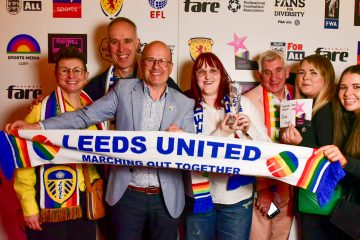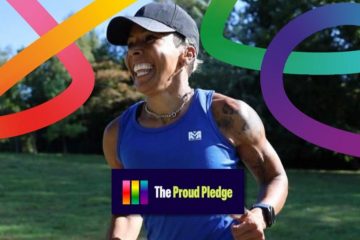‘It’s an honour!’: Football v Homophobia Awards winners on why nominations are needed
It’ll soon be time for the third annual Football v Homophobia Awards, sponsored by Puma – and it’s your last chance to nominate before the deadline on Friday, January 14. Sports Media LGBT+ asked four previous winners what it means to be recognised, and why everyone should be offering suggestions for the shortlists…
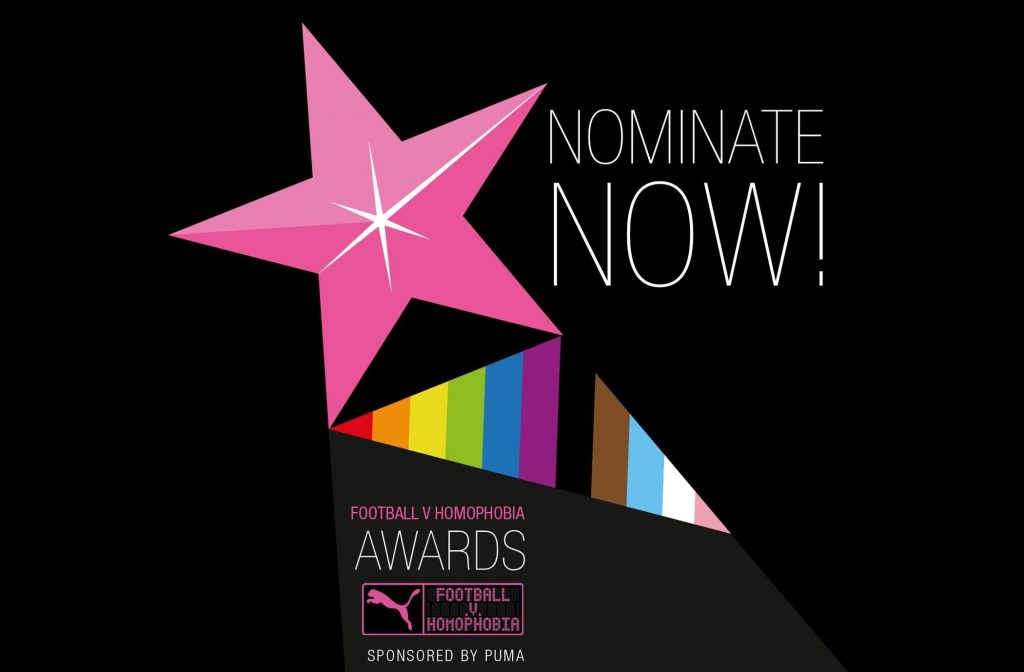
For well over a decade, the Football v Homophobia campaign has been advocating for a global game in which LGBTQ+ people are always part of the team.
To recognise those making a real difference on inclusion at all levels of the sport, FvH introduced in 2020 an Awards event, inviting players, coaches, officials and fans to nominate clubs, groups and individuals. Sponsored by Puma, the Awards have been a big success – and they are back for their third installment in 2022!

Now expanded to NINE categories – and with an FvH Americas equivalent also established – there’s even more scope to celebrate the good work that’s been done in the last 12 months to lift up lesbian, gay, bi and trans folk in football and kick out homophobia, biphobia and transphobia.
The FvH Awards judging panel includes representation from within the campaign itself, plus expertise in inclusion, education, and media and comms.
You can submit your nominees here – the deadline is Friday, January 14 – but before you do, Sports Media LGBT+ invites you to hear from four people who have all proudly collected FvH gongs at the last two ceremonies. They are…
- Chris Paouros, co-founder of Proud Lilywhites; FvH Hero award winner in 2020
- Gary Ginnaw, co-founder of Charlton Invicta FC, who were Grassroots Club award winners in 2020 and 2021
- Beth Fisher, ITV Sport Wales reporter; Women’s Game award winner alongside Anita Asante in 2021
- Neil Basterfield, co-founder of Proud Baggies, who were Fan Group winners in 2020 and 2021
Read on as our quartet of past winners give you the lowdown on the awards…
Why are the FvH Awards important – and what did it mean to you to win?

Chris Paouros: One of the things that really matters in football is belonging, and for too long, LGBTQ+ folk haven’t felt like we belong in football. FvH has been working tirelessly for more than 10 years to address this. They are the trailblazers and since the campaign started, more and more individuals and organisations have been working hard on LGBTQ+ inclusion in football and to combat LGBTQ+ discrimination. That’s why these awards are important because they recognise all the incredible work happening up and down the country.
It meant a huge amount to me to win the FvH Hero award but it wasn’t just for me, it was for all the Proud Lilywhites team and all the others I work with on a daily basis to ensure that belonging.
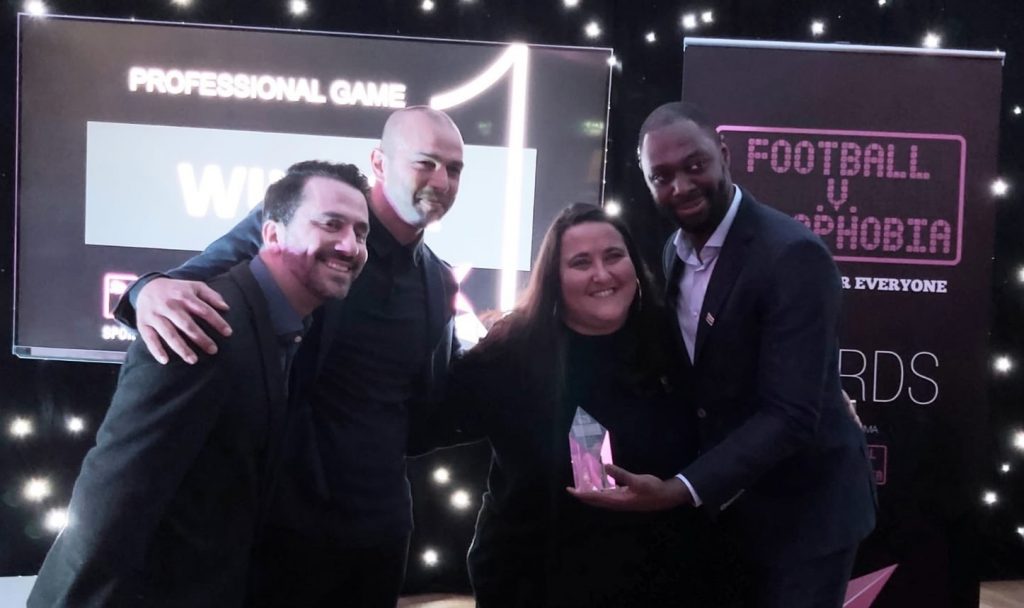
Gary Ginnaw: The Awards are a great way of giving deserved recognition to those that are working hard to positively engage with LGBTQ+ people to build inclusion and acceptance within the game. There are so many clubs and organisations around the UK doing great work to tackle LGBTphobia, and not all get the praise they deserve. Through the awards, we can show thanks and give praise to those going above and beyond.
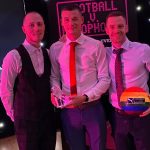
Winning two FvH Grassroots Club awards meant a great deal to Invicta. We’re an odd bunch at times and have been brought together through our love of football. It’s great recognition for the work the club does on and off the pitch. We’ve impacted so many people in South-East London and Kent. They are difficult places to be openly LGBTQ.
We’re technically based in New Eltham, historically Bexley. We’re not fortunate to be in an area that has a large LGBTQ+ demographic. There aren’t gay bars and clubs where people within the area can feel safe and accepted. At times, we’re probably the only safe place for people to come along and be their authentic selves. Further into central London and other key cities like Manchester, Liverpool, Birmingham and beyond, it’s in my opinion certainly a lot easier to find a community to be part of – we don’t have that luxury at Invicta. So the awards meant we had gone over and above for the people that mean the most to us – our members and anyone connected with Charlton Athletic and the local LGBTQ+ community.
Read about Charlton’s hat-trick success at the 2021 Football v Homophobia Awards…

Beth Fisher: Neither Neetz nor I do any of our campaigning to win awards, but ultimately it was a real honour to be recognised by FvH. We truly believe that if it helps just one person to recognise that this space is for them – and they haven’t seen that before – then it’s doing its job. Equally, any talk around LGBTQ+ issues within football hopefully means the message is getting out to more people. Working together with FvH is something we really feel passionate about and we hope it affects more change.
Neil Basterfield: Getting external validation, such as via the FvH Awards, helps a group like Proud Baggies build credibility with our club and with our members – this leads to more opportunities, and more members wanting to get involved. In our case, having the growing trust of West Brom allows us a bigger say and moves LGBTQ+ matters up the agenda, as well as with club-affiliated organisations like the Albion Foundation which has enabled us to get into schools to promote LGBTQ+ inclusion.
The awards also gives us wider visibility outside of the club, which in turn leads to additional opportunities to get involved nationally and within the Midlands (e.g. media & speaking opportunities always increase after we win an award – this allows us to deliver our message further afield). Finally, it’s strengthened our relationship with FvH and allows us to promote their work across our contacts. All in all, the awards have helped us to build a stronger LGBTQ+ sports network, improves our standing, and enables us to do more good work.
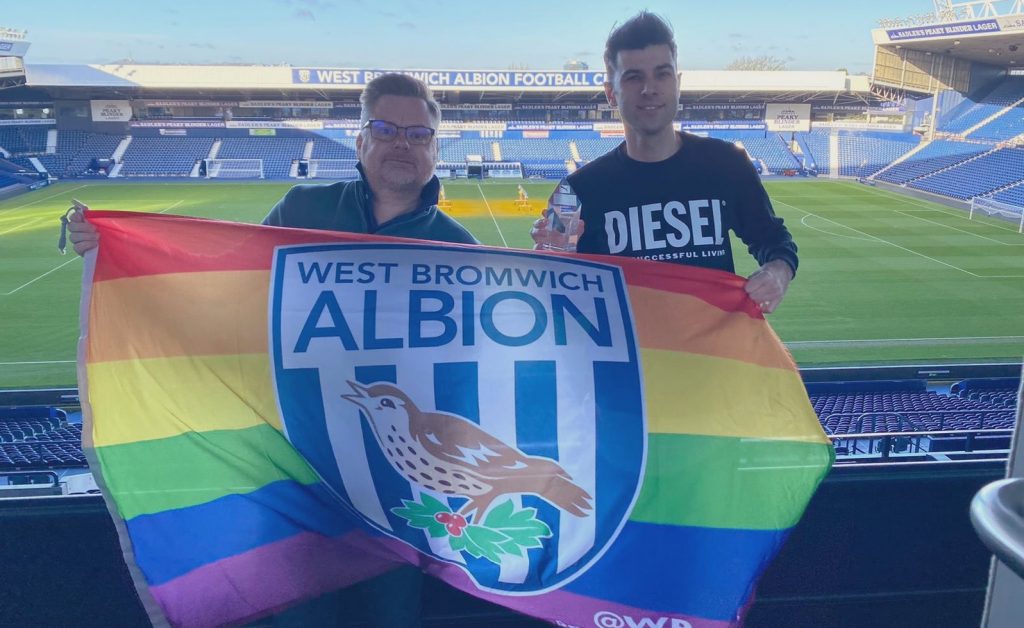
We’re asking people to nominate clubs at all levels who are doing good work on LGBTQ+ inclusion. What makes a club stand out in this space?
CP: For me, it’s about a real commitment and not just paying lip-service. It’s easy to write some comms and although messaging is really important, the action behind it is crucial. This work changes lives so actively supporting your LGBTQ+ players, fans, officials, staff etc makes a real and tangible difference. This is work that should be embedded throughout everything an organisation does and not some kind of silo activity – the organisations that do this well, stand out.
GG: I think what makes a club stand out is ensuring they are ‘everyone inclusive’ – the ultimate goal is that word ‘inclusion’, it’s about creating a space for everyone. That includes allies who play a massive part in breaking down the barriers that continue to exist within the game.
Professional clubs should engage with their local LGBTQ+ community and help to educate their fanbase and staff to be better allies and more LGBTQ+ supportive. They could help to establish an LGBTQ+ supporters group if one doesn’t already exist. Grassroots and non-League clubs need to interact with their local LGBTQ+ community to empower them to get into (or back into) playing or watching football. They need to show that the game is a safe and welcoming space for LGBTQ+ people.
NB: Training and raising awareness within the club, rather than externally, is really important – so those clubs that take time to work with FvH to train their players and staff deserve a particular mention. For example, Proud Baggies delivered an LGBTQ+ awareness session to the football set-up at St Mary’s University who had reached out to FvH for no other reason than their belief that this was an important topic to discuss across their teams.
When it comes to the work of LGBTQ+ fan groups, what impresses you?
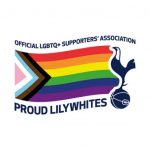
BF: It can be hard to quantify because you sometimes don’t know the impact a smaller group can have on someone. If it helps one person be more themselves, then that’s job done. If you take a well-established LGBTQ+ fans group like Proud Lilywhites for instance, they’ve not only done an amazing job of ensuring that there’s a safe space for people within our community to be together and watch their team, but also they’re now at the forefront when it comes to talking about good or bad things that happen within football – only in the last week, they spoke out about homophobic chanting at the Chelsea vs Tottenham tie in the Carabao Cup.
That’s really important because then people can grow power within that. Whatever a group starts up, even if it starts small, it can gain momentum and that will hopefully ensure more is done within the game, not just in the stands but outside as well.
I’m going to be a little biased here but The Rainbow Wall, which is the LGBTQ+ group for Wales fans, has done an amazing job. They started from scratch in 2021 and have not only done the basic element of creating a safe space for LGBTQ+ fans to meet and speak but they’ve also got branding out for the men’s match vs Belgium, and had a social asking the Belgian fans to come along too. Those international relations are really important because whilst when we have home games here people can feel safer, when you go abroad is when people can feel less safe. They’ve been outstanding and it’s been really nice to see that group grow.
NB: Most of the very visible fan groups tend to be those in the Premier League where they are supported by their clubs with considerable resources. I’ve been impressed by the groups of clubs lower down the EFL (e.g. Argyle Pride, Salopian Pride) who are dedicated to making change happen where it’s needed, most often without any support or wide publicity. In some instances, fan groups are even fighting against their own clubs, to varying degrees.
We admire those groups who, like us at Proud Baggies, are the ones who drive their clubs to deliver on LGBTQ+ inclusion rather than those (often the bigger teams) where it is the club itself that is largely responsible for driving and delivering content, utilising the fan group for leverage.
And how about Heroes? What are you holding out for there?

NB: For Heroes, I’d be looking at volunteers who give up time and effort all year round for free to support LGBTQ+ awareness, not just high-profile individuals or those that pop up every now and then! An example would be those who run an organisation like the GFSN – that will be a huge amount of effort for very little public reward, yet without these sorts of volunteers there would be no LGBTQ+ league etc.
CP: Some of the heroes for me this year have been journalists, ensuring we hear the stories and driving activity. I thought Adam Crafton’s piece on Saudi Arabia for The Athletic was game-changing. It’s the stuff that takes us out of our usual bubble that has struck me this year, particularly given the Euros – the impact of Harry Kane wearing the rainbow armband, for example.
GG: Anwar Uddin epitomises the FvH Hero Award for me – for someone who’s an ally to LGBTQ+ people, he just gets it. He’s faced discrimination during his professional football career. He uses his experience to help better the lives of others. Through the Fans For Diversity campaign, Anwar actively supports and encourages both the establishment and growth of LGBTQ+ supporters groups up and down the country.
BF: The work Jason Webber has done at FA Wales has been outstanding. He’s put on seminars and panels; we’ve had Gareth Bale wearing the rainbow captain’s armband, and the same for the women; there’s been visibility on the international stage and strong messaging from Wales women as well on homophobia, biphobia, and transphobia. They’ve really made a difference in Wales in 2021.
Thanks so much to Chris, Gary, Beth and Neil for contributing. Remember – get your FvH Awards nominations in before Friday!
And you can also nominate for the FvH Americas Awards, which has five categories – the deadline is the same, 14 January.
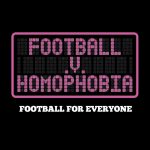
Football v Homophobia is an international initiative that exists to challenge discrimination based on sexual orientation, gender identity and expression at all levels of football. Launched in 2010, Football v Homophobia runs an annual Month of Action, which takes place in February during LGBT+ History Month. The Month of Action calls on individuals and organisations at all levels of football to take meaningful action to create more LGBT+ inclusive spaces in the game and address all forms of discrimination.
Sports Media LGBT+ is a network, advocacy, and consultancy group that is helping to build a community of LGBTQ+ people and allies in sport. We’re also a digital publisher. Learn more about us here.
LGBTQ+ and have a role in sports? Your visibility will inspire other people – sharing your story can be hugely rewarding and you don’t have to be famous to make a positive and lasting impact. We encourage you to start a conversation with us, in confidence, and we’ll provide the best advice on navigating the media as part of your journey so that you retain control of your personal narrative.
